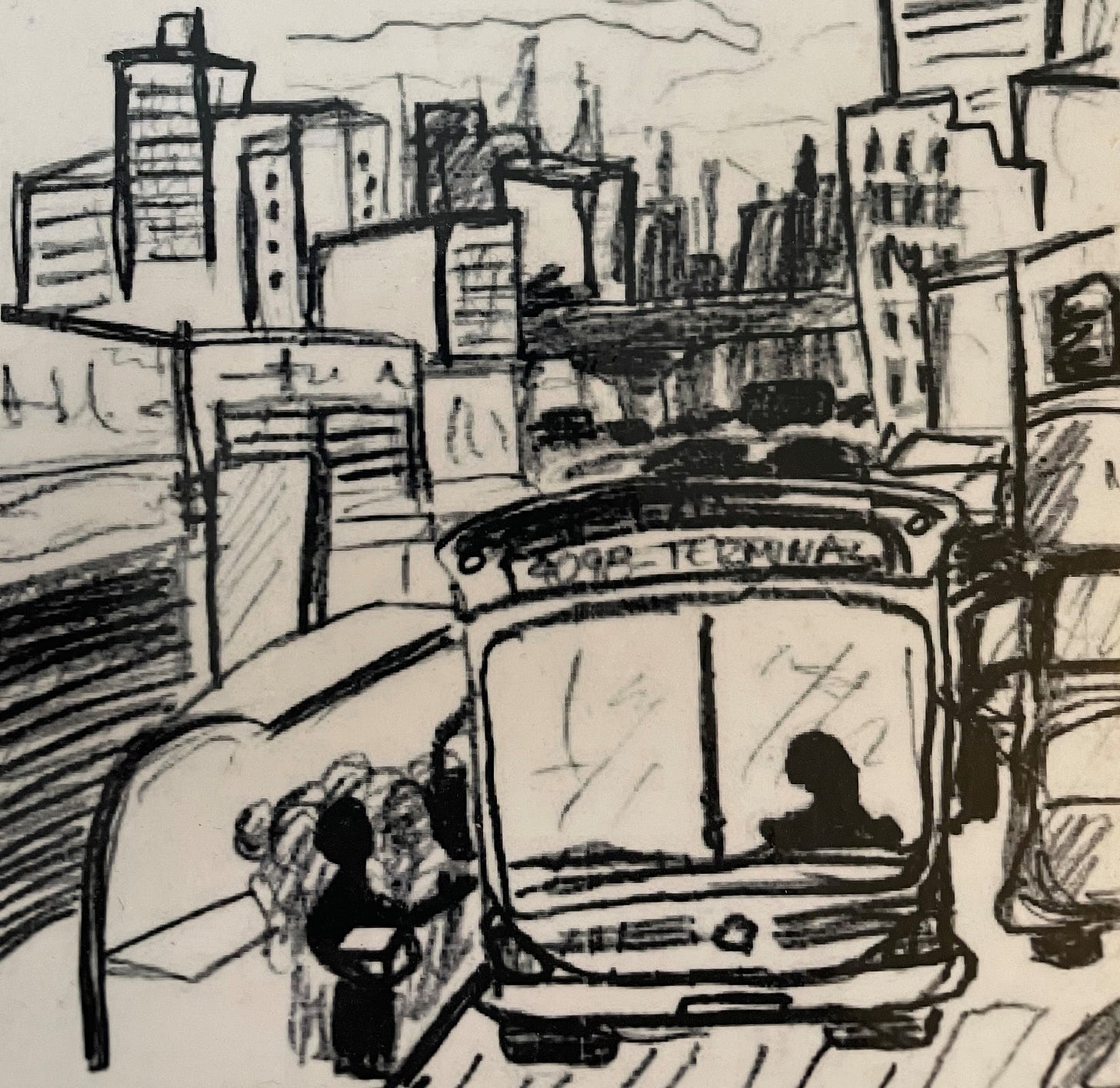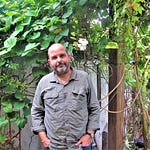
→ Press play to listen to my conversation with João Villaverde about Eduardo Lalo’s work.
→ Aperte o play para escutar a minha conversa com João Villaverde sobre a obra de Eduardo Lalo (em inglês).
The newsletter can be read in English or Portuguese. For the Portuguese version, scroll down.
A newsletter pode ser lida em inglês ou português. Para a versão em português, arraste para baixo.
English Version
I have been fascinated by the concept of invisibility for at least fifteen years now. As the final project for my Bachelor’s degree in journalism, I wrote a book about the street vendors of São Paulo. These are informal workers who sell candies on public transportation in the city. They hop on buses and trains every day and give creative speeches to sell their products. In my writing about their lives, I note that São Paulo forces its citizens to dismantle their own invisibility to survive. Street vendors, I write, make daily invitations to be seen by their fellow citizens (and prospective buyers). Most are ignored. Most remain invisible.
In “Los Países Invisibles”, Lalo writes: “Invisibility is not only a function of what we see (or what is heard, what is felt), but it is a place in history, the position that one occupies vis-à-vis structures of domination”. Lalo sees many sources of invisibility in today’s world, and he gives examples in the podcast we launched earlier this month. I’ll give my own: I’ve been reading the book “Born in Blackness: Africa, Africans, and the Making of the Modern World, 1471 to the Second World War” by Howard French, which re-tells the world’s history through African, and not European, lenses. French links African history to the origins of modernity, making us rethink all we’ve learned in history classes from elementary school to college. What the author does is make African history, which thus far had been obliterated, visible.
Recognizing the invisibility of others is important, but so is knowing what to do with that awareness. Lalo’s solution to the latter is to purposefully ignore what comes from places of hypervisibility. As an example, he mentions his choice to not pay attention to cultural productions from European countries. According to him, this allows him to experience what in Spanish is known as the intemperie - a space in the world in which life presents itself outside of structures of domination.
While I also seek to experience the intemperie, I take this isolation as extremely problematic because it imprints in us a “we” vs. “them” mentality. Let me explain. Because I recognize Africa’s invisibility in the world’s history, I’m reading Howard French’s and many other books that correct that distortion. I am purposefully seeking to understand history from an African perspective. However, I don’t ignore works that also teach me about history from a European perspective. To me, these are complementary views. Together, they give me the full picture of how history unfolded throughout the years. I also recognize the invisibility of street vendors in São Paulo, and that is why I decided to tell their stories in college. But I don’t disregard those who ignore them. On the contrary: I feel urged to engage with them so I can make street vendors visible not only to me but also to them.
If there is still any hope of living harmoniously in society, we must blur the lines that separate visibility and invisibility. I became even more attached to this idea after reading “The White Castle”, by Orhan Pamuk. Pamuk tells the story of a young Italian scholar who is taken prisoner by a Turkish fleet. Later, he becomes a slave of a scholar known as Hoja, who is his doppelganger. Hoja learns from the narrator, the narrator learns from Hoja, and their interaction is so symbiotic that at some point it is hard to tell who is who. Pamuk pushes the “we” vs. “them” mentality regarding the East and the West to an extreme by instigating reflections such as the following:
Afraid, I would say nothing; as if to break my last effort at resistance he would ask once again: was it not the best proof that men everywhere were identical with one another that they could take each other’s place?
Yes, we must recognize structures of domination and invisibilities. We must also act to make the dominated free, and the invisible, visible. However, renouncing completely from what is visible compromises our sight, forcing us to always perceive the world in partial ways. We must seek to grasp it all - the visible and the invisible - accepting the contradictions that come with this decision. That is what allows us to live fully as human beings. That is what allows us to actually experience the intemperie.
Versão em Português
Tenho fascínio pela ideia de invisibilidade há pelo menos quinze anos. Para o projeto final do meu curso de graduação em jornalismo, escrevi um livro sobre os vendedores ambulantes de São Paulo (trabalhadores informais que vendem doces nas redes de transporte público da cidade). Todos os dias, eles sobem em ônibus e trens e fazem discursos criativos para vender seus produtos. No livro, assinalo que São Paulo força seus habitantes a desconstruir suas próprias invisibilidades para sobreviver. Os vendedores ambulantes, escrevo, fazem convites diários para serem vistos por outros paulistanos (e potenciais clientes). A maior parte deles é ignorada. A maior parte permanece invisível.
Em “Los Países Invisibles”, Lalo escreve: “A invisibilidade não é função exclusiva do que vemos (ou o que ouvimos, ou sentimos), mas um lugar na história, uma posição que ocupamos vis-à-vis estruturas de dominação”. Lalo enxerga muitas fontes de invisibilidade no mundo atual, e dá exemplos no podcast que lançamos no começo deste mês. Darei o meu próprio exemplo: estou lendo o livro “Born in Blackness: Africa, Africans, and the Making of the Modern World, 1471 to the Second World War”, de Howard French (sem tradução para o português), que reconta a história do mundo a partir de uma perspectiva africana, e não europeia. French associa a história africana às origens da modernidade, levando-nos a repensar tudo o que aprendemos em aulas de história do ensino fundamental até o ensino superior. O que o autor faz é tornar a história africana, que até então era esquecida, visível.
Reconhecer a invisibilidade dos outros é importante, mas é igualmente fundamental saber o que fazer com esse conhecimento. A solução de Lalo é ignorar propositadamente o que vem de locais de hipervisibilidade. Por exemplo, ele diz que escolhe não prestar atenção em produções culturais de países europeus. Segundo ele, tal decisão permite que ele experiencie o que em espanhol é conhecido como a intemperie - um espaço no mundo no qual a vida se apresenta fora das estruturas de dominação.
Também busco viver a intemperie, mas vejo esse isolamento como extremamente problemático porque ele cria em nós a mentalidade do “nós” vs. “eles”. Explico. Porque reconheço a invisibilidade do continente africano na história mundial, estou lendo o livro de Howard French e muitos outros que corrigem essa distorção. Estou propositadamente buscando entender a história a partir de uma perspectiva africana. Entretanto, não ignoro trabalhos que também ensinam sobre a história a partir de uma perspectiva europeia. Para mim, essas visões são complementares. Juntas, elas oferecem uma explicação completa sobre como a história se desenrolou ao longo dos anos. Também enxergo a invisibilidade dos vendedores ambulantes de São Paulo, e por isso resolvi contar suas histórias como estudante de jornalismo. Mas não descarto os paulistanos que os ignoram. Pelo contrário: busco falar com essas pessoas para tornar os vendedores ambulantes visíveis também aos olhos delas.
Se há alguma esperança de vivermos harmoniosamente em sociedade, precisamos borrar as linhas que separam a visibilidade da invisibilidade. Passei a acreditar ainda mais nessa ideia depois de ler o livro “O Castelo Branco”, de Orhan Pamuk. Pamuk conta a história de um estudioso italiano que é capturado por um navio turco. Depois, ele se torna escravo de outro estudioso chamado Hoja, que é seu doppelganger. Hoja aprende com o narrador, e o narrador aprende com Hoja, e a interação deles é tão simbiótica que em um determinado momento é difícil saber quem é quem. Pamuk leva a mentalidade do “nós” vs. “eles” em relação ao Ocidente e ao Oriente ao extremo, e propõe reflexões como a abaixo:
Com medo, eu não dizia nada; como se para interromper o meu último esforço de resistência, ele me perguntou mais uma vez: o fato de dois homens tomarem o lugar um do outro dessa maneira não seria a melhor prova de que os homens de todos os lugares são idênticos?
Sim, precisamos reconhecer as estruturas de dominação e as invisibilidades. Também precisamos agir para tornar os dominados livres, e os invisíveis, visíveis. Entretanto, ao renunciar completamente ao que é visível, comprometemos a nossa própria visão, já que passamos a enxergar o mundo sempre de maneira parcial. Precisamos enxergar tudo - o visível e o invisível - e aceitar todas as contradições que aparecem com essa decisão. É isso o que nos permite viver plenamente como seres humanos. É isso o que nos permite realmente vivenciar a intemperie.











Notes on visibility and invisibility | Notas sobre visibilidade e invisibilidade